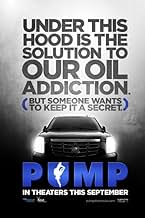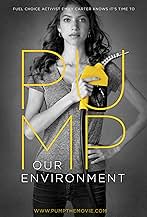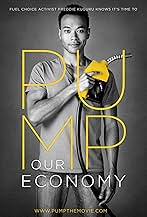A documentary that tells the story of America's addiction to oil, from its corporate conspiracy beginnings to its current monopoly today, and explains clearly and simply how we can end it - ... Read allA documentary that tells the story of America's addiction to oil, from its corporate conspiracy beginnings to its current monopoly today, and explains clearly and simply how we can end it - and finally win choice at the pump.A documentary that tells the story of America's addiction to oil, from its corporate conspiracy beginnings to its current monopoly today, and explains clearly and simply how we can end it - and finally win choice at the pump.
- Directors
- Writer
- Stars
Greg Anderson
- Self - Author. Designated Drivers
- (as Dr. Greg Anderson)
Daniel Caesar
- Self
- (as Daniel Ceasar)
Luiz Inácio Lula da Silva
- Self
- (as Luiz 'Lula' da Silva)
- Directors
- Writer
- All cast & crew
- Production, box office & more at IMDbPro
Featured reviews
The word "choice" comes up again and again in this movie to promote alternative fuels, but it doesn't present solid grounds for choosing, and indeed seems to be advocating for government to force adoption. This is simply propaganda. It does provide a basic introduction to the various fuel options, their history and current use, which casts doubt on gasoline's status as the standard fuel, particularly in terms of emissions. But the claim that US oil companies rigged the market to force us to use oil conflicts with warnings of foreign control, and the assertion that Prohibition was engineered by Rockefeller to stop ethanol vehicles pushes the narrative into the realm of conspiracy theory. Not once does the movie mention that biofuel has less energy per gallon, and the production of electricity to charge electrics is also left hazy, so the economics aren't even touched upon. "Choice" is hardly desirable if it means you will be choosing badly.
This movie is very slick, in both the good and bad meanings of that word. It does not bother with qualifying statements at all. In discussing Ethanol from sugarcane in Brazil, they do not discuss the environmental impact from clear cutting and burning. There is no real discussion of the break even point or capitalization required for methanol and ethanol production.
Several other issues:
* Flex Fuel may require fitting changes as well as a new ECU.
* Modern Flex Fuel automotive equipment was developed by a consortium.
* Trots out the GM trolley car conspiracy without any evidence.
* Claims that Prohibition targeted Ethanol fuel without any evidence.
I wish I could trust this documentary at all.
Several other issues:
* Flex Fuel may require fitting changes as well as a new ECU.
* Modern Flex Fuel automotive equipment was developed by a consortium.
* Trots out the GM trolley car conspiracy without any evidence.
* Claims that Prohibition targeted Ethanol fuel without any evidence.
I wish I could trust this documentary at all.
10tamar-23
As an average movie-goer, PUMP grabbed me the instant I sat down and held me still after I left the theater. Though slightly long for a documentary, every minute is relevant and inspiring. This movie is not about political parties or global warming, it is about YOU and ME - the people that make up this beautiful country. The dent that oil prices are leaving in my wallet are devastating and I'm thrilled to see that something is being done about it and that near and long-term alternatives to oil are out there. Please go see this illuminating film - rate it, spread the word, and find out how you can put some cash back in your wallet.
Greetings again from the darkness. Documentaries with a message are usually most effective when they engage in debate ... share both sides of the argument, if you will. Preaching from a soapbox typically causes the viewer to tune out, and the opportunity is missed. The one exception to this is when the stance is heavily supported with history, facts, data, research and pertinent interviews. Husband and wife co-directors Joshua Tickell and Rebecca Harrell Tickell deliver what amounts to a visual thesis on how to break the big oil monopoly.
Beginning with a colorful montage of beautiful and colorful automobiles, we are quickly reminded of Americans love of their cars which leads to the addiction to oil. The next 90 minutes provides a trek through the key historical events that led to our oil dependency, and ends with a proposal on how to stop it.
The history lesson discusses John D Rockefeller and his Standard Oil monopoly, followed by his political influence to get Prohibition passed. This after Henry Ford called alcohol "the perfect fuel". We then learn of how large companies drove out the trolley system in favor of an interstate freeway system for cars. We re-live the 1973 gas shortage as the Arab countries flexed - or extorted, depending on your take. Jumping to 2008, the surge in oil prices to $147 per barrel is described as the economic earthquake, with the Stock Market crash termed an aftershock. In other words, oil is the foundation of our economy. Today's global market is discussed along with the exponential growth of China's car industry - 15 million cars sold this year. This time-line with specific data leads to the impressive second half of the film ... how to get ourselves out of this mess.
For those who say it's foolish to discuss breaking our dependency on oil because it is used in so many other ways, they are missing the point. The cause is less oil dependency for cars, not a total break from it's use in products such as medicines, clothes, plastics, etc. The filmmakers offer the options of both electric cars and alternative fuel sources.
Elon Musk's Tesla Motors is briefly discussed, with the acknowledgment that battery technology improvement is vital to the future success of electric cars. A more immediate solution comes in the form of alternative fuels - ethanol and methanol. We see the exceptional strides Brazil has made with strong leadership. We see how our current vehicles already have the capability to run on these biofuels, if not for a simple software adjustment built-in by auto-makers. Nine million flex fuel cars on the road now, and many of these owners remain unaware of their options. Why? Because fueling stations are so tough to come by, as only the most independent of stations are not contractually obligated to big oil companies.
The film is exceptionally well researched and the data delivered in an easy to understand format. The Tickell team won the Sundance award for the 2008 documentary Fuel, and their message is even stronger this time out. By the way, Ms. Tickell is a former child actress known as Sam Elliot's daughter in the 1989 Christmas classic Prancer. She and her husband are now renowned environmental activists, and this project is really a call to action ... the choices are available NOW to break the oil monopoly.
Beginning with a colorful montage of beautiful and colorful automobiles, we are quickly reminded of Americans love of their cars which leads to the addiction to oil. The next 90 minutes provides a trek through the key historical events that led to our oil dependency, and ends with a proposal on how to stop it.
The history lesson discusses John D Rockefeller and his Standard Oil monopoly, followed by his political influence to get Prohibition passed. This after Henry Ford called alcohol "the perfect fuel". We then learn of how large companies drove out the trolley system in favor of an interstate freeway system for cars. We re-live the 1973 gas shortage as the Arab countries flexed - or extorted, depending on your take. Jumping to 2008, the surge in oil prices to $147 per barrel is described as the economic earthquake, with the Stock Market crash termed an aftershock. In other words, oil is the foundation of our economy. Today's global market is discussed along with the exponential growth of China's car industry - 15 million cars sold this year. This time-line with specific data leads to the impressive second half of the film ... how to get ourselves out of this mess.
For those who say it's foolish to discuss breaking our dependency on oil because it is used in so many other ways, they are missing the point. The cause is less oil dependency for cars, not a total break from it's use in products such as medicines, clothes, plastics, etc. The filmmakers offer the options of both electric cars and alternative fuel sources.
Elon Musk's Tesla Motors is briefly discussed, with the acknowledgment that battery technology improvement is vital to the future success of electric cars. A more immediate solution comes in the form of alternative fuels - ethanol and methanol. We see the exceptional strides Brazil has made with strong leadership. We see how our current vehicles already have the capability to run on these biofuels, if not for a simple software adjustment built-in by auto-makers. Nine million flex fuel cars on the road now, and many of these owners remain unaware of their options. Why? Because fueling stations are so tough to come by, as only the most independent of stations are not contractually obligated to big oil companies.
The film is exceptionally well researched and the data delivered in an easy to understand format. The Tickell team won the Sundance award for the 2008 documentary Fuel, and their message is even stronger this time out. By the way, Ms. Tickell is a former child actress known as Sam Elliot's daughter in the 1989 Christmas classic Prancer. She and her husband are now renowned environmental activists, and this project is really a call to action ... the choices are available NOW to break the oil monopoly.
Riveting! This film examines the story of oil addiction in America. The question is, do we have a choice of fuel?
The purpose of this film is to spread the word that oil is not the only source of fuel for the U.S. I'm guessing parents out there love their cars and know that gas prices are the highest they've been in years. In order to take your child to school, you need to pay and pump expensive gasoline. Or, do you? This film shows that we can have a choice about fuel. Fuel is available that is safer, better for the air and cheaper. Pump proves these ideas with intriguing facts and mind-boggling statistics.
This movie's focus is not about which fuel is better. This documentary provides information about alternative fuels such as ethanol, methanol, natural gas and even electric. Each one has its pros and cons, but just being able to have the ability to choose is what moves this production along.
We hear extremely intellectual interviews with people who are strong about the subject. My only criticism is that the audience for this film is not young kids. Teens who are driving or those starting driver's education will find this important enough to watch. While I found the subject interesting, I do not think kids from 7 to 13 care about the big oil epidemic.
My favorite part is when we see the comparison of air pollution with regular gasoline and methanol, also known as "Wood Alcohol." Dr. Robert Zubrin conducts an experiment where he ignites both fuels. We see that methanol is clean and leaves no residue while gasoline is the opposite. It made me realize what we put in the air every time we run a gasoline engine.
My favorite person interviewed is Luiz Inacio Da Sliva, 35th president of Brazil. The movie states, "under Da Sliva's leadership, Brazil's economy grew by the trillions." He did something that no other country has ever done, achieve complete independence from foreign oil. He gave Brazil the choice of gasoline and ethanol. Da Sliva is what you might call a dreamer. He states, "I believe we will conquer this. I believe the world will learn to live without oil."
This film wants to expose U.S. citizens to the idea of having a choice. We know that there are other forms of fuel and you might think we would use them. This idea was introduced in 2006 with the "Open Fuel Standard Act." Sadly, it never left a committee for a vote. The reason being, that members of the Congress receive 32 million dollars in campaign contribution from big oil.
I give this film 5 out of 5 stars and recommend it to 14 to 18-year- olds. This film shows a great message and an even more amazing vision.
Reviewed by Keefer B.
The purpose of this film is to spread the word that oil is not the only source of fuel for the U.S. I'm guessing parents out there love their cars and know that gas prices are the highest they've been in years. In order to take your child to school, you need to pay and pump expensive gasoline. Or, do you? This film shows that we can have a choice about fuel. Fuel is available that is safer, better for the air and cheaper. Pump proves these ideas with intriguing facts and mind-boggling statistics.
This movie's focus is not about which fuel is better. This documentary provides information about alternative fuels such as ethanol, methanol, natural gas and even electric. Each one has its pros and cons, but just being able to have the ability to choose is what moves this production along.
We hear extremely intellectual interviews with people who are strong about the subject. My only criticism is that the audience for this film is not young kids. Teens who are driving or those starting driver's education will find this important enough to watch. While I found the subject interesting, I do not think kids from 7 to 13 care about the big oil epidemic.
My favorite part is when we see the comparison of air pollution with regular gasoline and methanol, also known as "Wood Alcohol." Dr. Robert Zubrin conducts an experiment where he ignites both fuels. We see that methanol is clean and leaves no residue while gasoline is the opposite. It made me realize what we put in the air every time we run a gasoline engine.
My favorite person interviewed is Luiz Inacio Da Sliva, 35th president of Brazil. The movie states, "under Da Sliva's leadership, Brazil's economy grew by the trillions." He did something that no other country has ever done, achieve complete independence from foreign oil. He gave Brazil the choice of gasoline and ethanol. Da Sliva is what you might call a dreamer. He states, "I believe we will conquer this. I believe the world will learn to live without oil."
This film wants to expose U.S. citizens to the idea of having a choice. We know that there are other forms of fuel and you might think we would use them. This idea was introduced in 2006 with the "Open Fuel Standard Act." Sadly, it never left a committee for a vote. The reason being, that members of the Congress receive 32 million dollars in campaign contribution from big oil.
I give this film 5 out of 5 stars and recommend it to 14 to 18-year- olds. This film shows a great message and an even more amazing vision.
Reviewed by Keefer B.
Did you know
- TriviaWon the 2015 "Falsie" award for hidden agendas in documentaries
Details
Box office
- Budget
- $2,000,000 (estimated)
- Gross US & Canada
- $89,787
- Opening weekend US & Canada
- $42,200
- Sep 21, 2014
- Gross worldwide
- $89,787
- Runtime
- 1h 28m(88 min)
- Color
Contribute to this page
Suggest an edit or add missing content
























